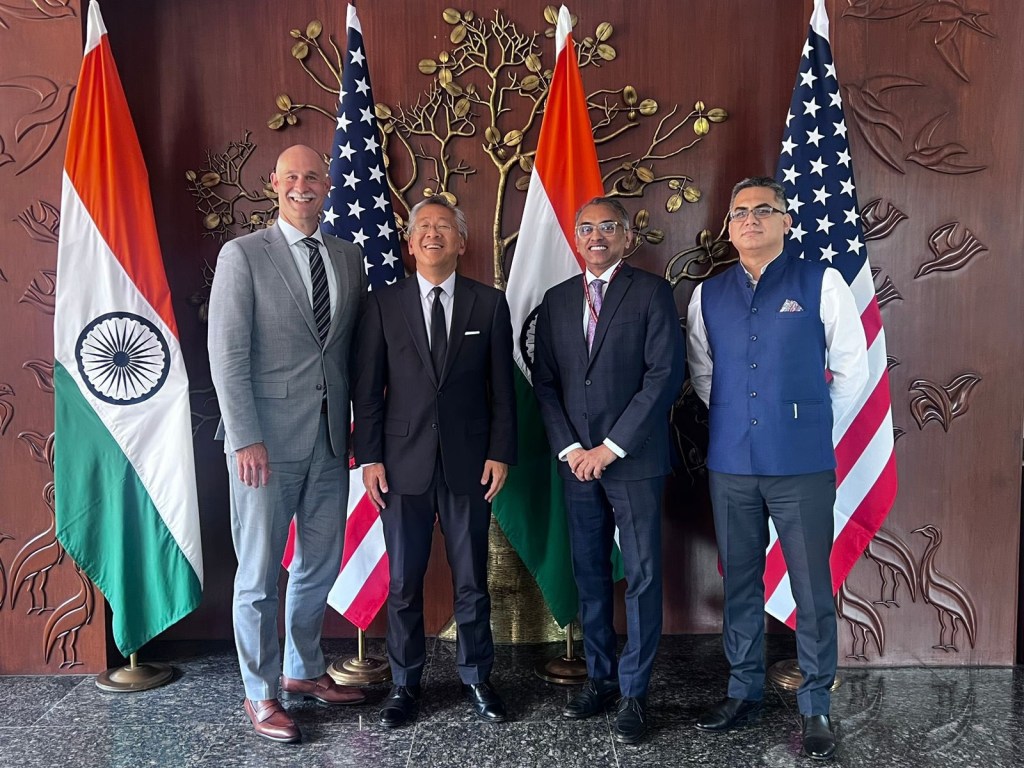Ahead of Indian Prime Minister Narendra Modi’s visit to the United States, the eighth India-US 2+2 Intersessional Dialogue took place in New Delhi, highlighting the nations’ commitment to advancing their strategic partnership. The discussions focused on a wide range of global and regional issues, including the Indo-Pacific, Ukraine, and Gaza, underscoring the deepening ties between the two democracies. This dialogue also serves as a precursor to the upcoming 2+2 Ministerial Dialogue, a crucial platform for bilateral cooperation.
The meeting featured senior officials from both sides. From India, Ministry of External Affairs Joint Secretary for the Americas, Nagaraj Naidu, and Ministry of Defence Joint Secretary for International Cooperation, Vishwesh Negi.
On the US side, Assistant Secretary of State for South and Central Asian Affairs, Donald Lu, and Principal Deputy Assistant Secretary of Defence for Indo-Pacific Security Affairs, Jedidiah P. Royal, led the discussions.
The dialogue emphasized mutual interests and joint priorities such as defence cooperation, space and civil aviation collaboration, industrial and logistics coordination, and clean energy cooperation. As reported by the US Department of State, the meeting was instrumental in laying the groundwork for the forthcoming ministerial talks, which are part of the ongoing efforts to enhance the India-US Comprehensive Global Strategic Partnership.
Among the key areas discussed were regional security and the global political landscape, particularly the ongoing conflicts in Ukraine and Gaza. Both sides reaffirmed their commitment to supporting a “just and durable peace in Ukraine” while advocating for a ceasefire and humanitarian assistance in Gaza. The discussions also extended to the Indo-Pacific region, where both India and the US seek to ensure peace, stability, and security.
The dialogue took place amid a broader context of evolving global challenges and opportunities. The focus on the Indo-Pacific reflects both nations’ commitment to a “free, open, and inclusive” region. This is part of a larger vision shared by India and the United States to uphold a rules-based international order. Both countries, which have natural and trusted partnerships, emphasized their shared values of democracy, human rights, and pluralism. “India and the U.S. are natural partners with a shared commitment to advance democracy, human rights, and pluralism,” said the Ministry of External Affairs in a statement.
Defence cooperation continues to be a cornerstone of the India-US relationship. Building upon recent high-level visits by Prime Minister Narendra Modi to the US in June 2023, the dialogue further advanced the strategic interests of both nations. Modi’s previous meetings with US President Joe Biden highlighted the strengthening of defence ties, technological collaboration, and joint efforts to combat climate change, among other priorities.
The Intersessional Dialogue also spotlighted clean energy cooperation as a critical component of the partnership. Both India and the US are keen to tackle global environmental challenges, with a focus on transitioning to sustainable energy sources and reducing carbon emissions.
Furthermore, expanding people-to-people ties remains a priority for both nations. Lu and Royal reiterated the United States’ commitment to deepening its partnership with India through cultural exchanges, educational collaborations, and fostering closer relationships between citizens. The dialogue also advanced logistical cooperation, a move that will enhance industrial collaborations and bolster bilateral trade.
